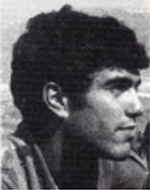Born in Jerusalem on July 25, 1956. He was 15 years old when he passed a training course in the Gadna Brigade. When he was in 12th grade, Goni volunteered to work as a stretcher at Hadassah during the Yom Kippur War, which was his first difficult encounter with the war, and as a result he left the nucleus of the Nahal Brigade, where he was a member. Goni was drafted into the IDF in November 1974. After completing his basic training, he volunteered for the Sayeret commando unit, where he completed his regular training course, and in 1976 he completed his training in an officers’ course, after which he returned to the brigade as a platoon commander in one of the battalions. In 1980, when he was just 24 years old, Goni was appointed commander of the reconnaissance unit, where he began as a rookie and was promoted to the rank of Major General Rafael Eitan spoke about Goni in a newspaper interview: “I knew Goni as the commander of the reconnaissance unit. I knew about him before, but there was no real acquaintance. I had almost total confidence in his ability as commander, leader, and person. My attitude towards him was unusual compared to others, and my criterion was his ability to function and his acceptance of the soldiers. The way he spoke and explained to the soldiers or the shape he was being interrogated after the act. I think he was a model warrior. Leadership, personal example, courage, very good professional knowledge, acceptable to people. “He could have advanced in the army without any disturbances … he could have been Golani Brigade commander easily. It’s enough for me to see how people behave, how they get their commanders. I see the behavior of the soldiers, the confidence that the commanders command. I heard that he was a good and brave fighter and a good officer. I saw that the reports corresponded to reality, perhaps did not even fully reflect his true level. To belong to the commando unit and to command the reconnaissance unit is all the more so. “It was said about Goni, who taught the cruiser and designed the soldiers, who was not” nice and professional, “one who came to his subordinates and did everything to win their sympathy. But he was at the same time the last arbiter, deciding and determining, as befitting a commander, gradually gaining their trust. Of the soldiers and their unconditional appreciation The soldiers and commanders of the commando unit are thinkers with high surgical ability, and such people are Hel Avigdor Kahalani, who was a division commander and knew Goni during the Druze riots in the Golan Heights, said that the Patrol was “a sort of symbol that followed one person after Goni. And allGoni liked the army and believed in what he was doing, but when he finished his command as commander in May 1982, he decided to leave the army and go to agricultural studies. Was to have a farm in the moshav, and if military life could be combined with agricultural life, he was accepted to study at the Faculty of Agriculture and planned a trip to the United States by the beginning of the school year. The government decided to enter Lebanon, called Avigdor Kahalani and asked to join the fighting. He joined the force of the brigade commander, and when he heard of the injury of the new commando commander, he took an armored personnel carrier and ran through a village of terrorists who had not been cleared to join the unit. Walking through the village until he met the fighters. After reorganization, he led the reconnaissance unit into battle. For hours he and his subordinates fought the outposts and the canals until the fortress was conquered. Goni fell during the last canal clearance at Beaufort. On June 16, 1982, Goni fell in battle for Beaufort, and was brought to rest at the military cemetery on Mount Herzl, leaving behind his mother, brother and two sisters.
